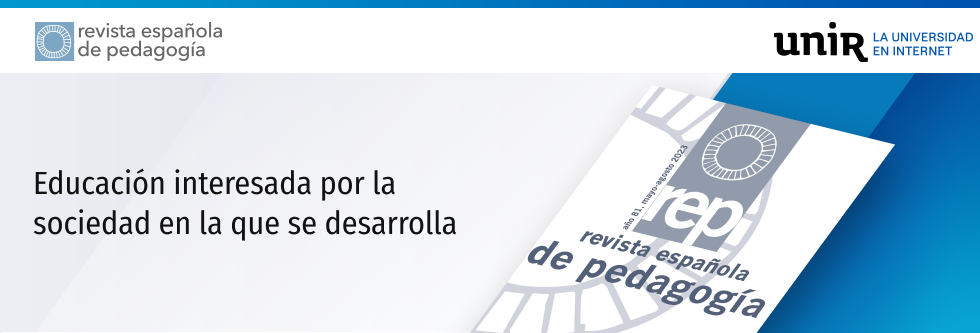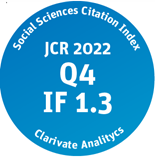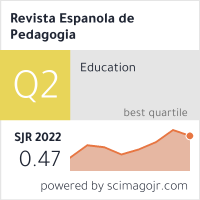DOI
10.22550/2174-0909.3928
Abstract
Music has been present in education for centuries, expressed differently in societies in different times and places, among which it is worth mentioning Classical Greece. Some of its philosophers and pedagogues emphasised the positive effect of musical education on human character. The objective of this article is to demonstrate the educational potential of music, as well as the relationship that exists between learning to play an instrument and character education. Based on the analysis of two key works from the Aristotelian corpus, the Politics and the Nicomachean Ethics, a viable virtue ethic can be created that focuses on craftsmanship. The idea of the craftsman proposed by Richard Sennett provides a guide for finding a method for musical practice where instrumental proficiency is at the heart of learning and the educational process. This shows how music education, in general, and learning to play an instrument, in particular, share a goal with character education: the comprehensive education of human beings. Learning music has the capacity to influence character by creating and reinforcing habits and virtues with a view to excellence and human flourishing. Through a concept of music practice based on craftsmanship, music and education can be used to influence the individual positively. In this way, certain practices and behaviours present in the Western tradition of music education can be redirected. Despite the fact that there are numerous ways to experience music, instrumental practice is recommended as the main one given the organological condition of music. As Aristotle’s practical philosophy emphasises praxis and music is essentially a human activity, it can be concluded that music education using instrumental practice has an influence on the multiple dimensions of an individual’s education and in constructing a community that shares the ultimate goal: flourishing.
Referencias | References
Andreu, M. (2012). L’assoliment de les competències bàsiques en alumnes de centres integrats de primària i música. Construcció i aplicació d’un instrument d’avaluació de les competències bàsiques i anàlisi comparativa dels resultats obtinguts en alumnes de sisè de primària de centres integrats de música i d’un grup control [The attainment of basic competences by pupils in centres that integrate primary and music education. The development and application of an instrument for assessing the basic competences and the comparative analysis of results obtained by 11 to 12-year-old pupils in primary schools with an integrated music syllabus and those obtained by a control group] [Doctoral dissertation, Universidad Autónoma de Barcelona]. Dipòsit Digital de Documents de la UAB. https://hdl.handle.net/10803/96516
Aristóteles. (2010). Ética a Nicómaco[Nicomachean ethics] (J. Pallí, Trans.). Gredos.
Aristóteles. (2015). Política [Politics] (C. García, & A. Pérez, Trans.) (2nd ed.). Alianza.
Aróstegui, J. L. (2011). Por un currículo contrahegemónico: de la educación musical a la música educativa [In support of a counter-hegemonic curriculum: from music education to instructional music]. Revista da ABEM, 19 (25), 19-29. https:// revistaabem.abem.mus.br/revistaabem/article/view/187
Aróstegui, J. L. (2013). El desarrollo de la identidad profesional del profesorado: el caso del especialista de música [The development of the professional identity of teachers: the case of the music specialist]. Revista Interuniversitaria de Formación del Profesorado, 27 (3), 145-159. http://hdl.handle.net/10201/121563
Ballantyne, J., Kerchner, J. L., & Aróstegui, J. L. (2012). Developing music teacher identities: An international multi-site study. International Journal of Music Education, 30 (3), 211-226. 10.1177/0255761411433720
Baricco, A. (2016). El alma de Hegel y las vacas de Wisconsin. Una reflexión sobre música culta y modernidad [The soul of Hegel and the cows of Wisconsin. A reflection on classical music and modernity]. Siruela.
Barnes, J. (1999). Aristóteles [Aristotle]. Cátedra.
Barrientos, A., Sánchez, R., & Arigita, A. (2019). Rendimiento académico, musical e inteligencias múltiples en alumnos preadolescentes de un centro específico de música [Academic, musical performance and multiple intelligences in pre-adolescent students of a specific music center]. European Journal of Child Development, Education and Psychopathology, 7 (2), 119-132. 10.30552/ejpad.v7i2.113
Bautista, A., & Fernández, B. (2020). Mala praxis en las enseñanzas instrumentales: implicaciones para la formación docente [Malpractice in instrumental teaching: Implications for teacher education]. Revista Electrónica de LEEME, (46), 240-261. 10.7203/LEEME.46.18013
Berkowitz, M., & Bier, M. (2005). What works in character education: A research-driven guide for educator. Character Education Partnership.
Bermell, M. Á., Bernabé, M.ª del M., & Alonso, V. (2014). Diversidad, música y competencia social y ciudadana: contribuciones de la experiencia musical [Diversity, music and social and civic competence: Contributions of musical experience]. Arbor, 190 (769), a164. 10.3989/arbor.2014.769n5003
Bernabé, M.ª del M. (2012). Contextos pluriculturales, educación musical y educación intercultural [Multicultural contexts, music education and intercultural education]. El artista, (9), 190-214. https://www.redalyc.org/articulo.oa?id=87424873012
Bernal, A., González-Torres, M. C., & Naval, C. (2015). La educación del carácter. Perspectivas internacionales [Character education. International perspectives]. Participación educativa. Revista del Consejo Escolar del Estado, 4 (6), 35-45.
Bowman, W. (2012). Practices, virtues ethics, and music education. Action, Criticism, and Theory for Music Education, 11 (2), 1-19. Burbules, N. C. (2019). Phronesis y complejidad [Phronesis and complexity]. Teoría de la Educación. Revista Interuniversitaria, 32 (1), 11-22. 10.14201/teri.20846
Carrillo, C., Baguley, M., & Vilar, M. (2015). The influence of professional identity on teaching practice: Experiences of four music educators. International Journal of Music Education, 33 (4), 451-462. 10.1177/0255761415582348
Casas-Mas, A. (2016). Mediaciones instrumentales entre distintas culturas de aprendizaje musical [Instrumental mediations between different music learning cultures]. Mediaciones Sociales, 15, 151-167. http://dx.doi.org/10.5209/MESO.54548
Castro, V. (2014). El valor de la música en nuestras escuelas [The value of the music in our schools]. Revista Internacional de Investigación e Innovación en Didáctica de las Humanidades y las Ciencias, (1), 61-67.
Chong, S., Rohwer, D., Emmanuel, D., Kruse, N., & Smilde, R. (2013). Community music through authentic engagement: bridging community, school, university and art groups. In K. K. Veblen, S. J. Messenger, M. Silverman, & D. J. Elliott (Eds.), Community music today (pp. 151-168). Rowman & Littlefield Publishers.
Cook, N. (2001). De Madonna al canto gregoriano. Una muy breve introducción a la música [From Madonna to Gregorian chant. A very short introduction]. Alianza.
Cuscó, J. (2013). El valor educatiu de la música. Una reflexió antropològica [The educational value of music. An anthropological reflection]. Temps d’Educació, (45), 255-272. https:// raco.cat/index.php/TempsEducacio/article/view/274661
Dewey, J. (2014). Naturaleza humana y conducta. Introducción a la psicología social [Human nature and conduct. Introduction to social psychology]. Fondo de Cultura Económica.
Duckworth, A. L., & Meindl, P. (2018). Clarifying character education. Commentary on McGrath. Journal of Character Education, 14 (2), 37-39.
Estrela, K. A. D. F. (2018). El papel de la música en la educación según la Política de Aristóteles [The role of music in education according to Aristotle’s Politics]. Revista Fragmentos de Cultura - Revista Interdisciplinar de Ciências Humanas, 28 (4), 465-471. 10.18224/frag.v28i4.6816
Fernández, B., & Casas, A. (2019). Por qué enseñar música no es suficiente: educación musical y su red nomológica [Why teaching music is not enough: Musical education and its nomological network]. Revista Internacional de Educación Musical, 7 (1), 3-13. 10.1177/2307484119878631
Fernández-Morante, B. (2018). Violencia psicológica en la educación musical actual en los conservatorios de música [Psychological violence in current musical education at conservatoires]. Revista Internacional de Educación Musical, 6 (1), 13-24. 10.12967/RIEM-2018-6-p013-024
Fuentes, J. L. (2018). Educación del carácter en España: causas y evidencias de un débil desarrollo [Character education in Spain: Reasons and evidences of a weak development]. Estudios Sobre Educación, 35, 353-371. 10.15581/004.35.353-371
García, I. (2013). Cuatro sentidos de la música en la filosofía griega [Four music senses in the Greek philosophy]. Azafea: Revista de Filosofía, 15, 21-37. https://revistas.usal.es/dos/index.php/0213-3563/article/view/12250
Harold, J. (2016). On the ancient idea that music shapes character. Dao, 15, 341-354. 10.1007/s11712-016-9515-9
Henley, J., & Higgins, L. (2020). Redefining excellence and inclusion. International Journal of Community Music, 13 (2), 207-216. 10.1386/ijcm_00020_1
Hemsy, V. (2011). Educación musical siglo XXI: problemáticas contemporáneas [Music education - 21st century. A contemporary view]. Revista da ABEM, 25, 11-18. https://revistaabem.abem. mus.br/revistaabem/article/view/186
Higgins, K. M. (2018). Connecting music to ethics. College Music Symposium, 58 (3), 1-20. 10.18177/sym.2018.58. sr.11411
Höffe, O. (2008). El proyecto político de la modernidad [The political project of modernity]. Fondo de Cultura Económica.
Jiménez, M. (2016). Aristotle on becoming virtuous by doing virtuous actions. Phronesis, 61 (1), 3-32. https://doi.org/10.1163/15685284-12341297
Jorgensen, E. R. (2003). The aims of music education: A preliminary excursion. The Journal of Aesthetic Education, 36 (1), 31-49. 10.2307/3333624
Jorquera, M. C. (2006). Educación musical: aportes para su comprensión a partir del origen de la disciplina [Music education: Contributions to its understanding based on the origins of the discipline]. Investigación en la escuela, (58), 69-78. https://re- vistascientificas.us.es/index.php/IE/article/view/7318
Jorquera, M. C. (2008). The music educator’s professional knowledge. Music Education Research, 10 (3), 347-359. https://doi.org/10.1080/14613800802280084
Karlsen, S., Westerlund, H., Partti, H., & Solbu, E. (2013). Community music in the Nordic countries: Politics, research, programs, and educational significance. In K. K. Veblen, S. J. Messenger, M. Silverman, & D. J. Elliott (Eds.), Community music today (pp. 41-58). Rowman and Littlefield Publisher.
Kristjànsson, K. (2015). Aristotelian character education. Routledge. Lee, J., Krause, A. E., & Davidson, J (2017). The PERMA well-being model and music facilitation practice: Preliminary documentation for well-being through music provision in Australian schools. Research Studies in Music Education, 39 (1), 73-89. 10.1177/1321103X17703131
Lickona, T. (1999). Educación del carácter: cultivar la virtud [Character education: cultivating virtue]. In C. Reigeluth (Ed.), Diseño de la instrucción. Teorías y modelos: un nuevo paradigma de la teoría de la instrucción [Instructional design. Theories and models: a new paradigm of instructional theory] (pp. 139- 160). Aula XXI/Santillana.
Lickona, T. (2018). Reflections on Robert McGrath’s “What is character education?”. Journal of Character Education, 14 (2), 49-57.
Lochmann, A. (2021). La vida sólida. La carpintería como ética del hacer [The solid life. Carpentry as an ethic of doing]. Catarata.
MacIntyre, A. (1987). Tras la virtud [After virtue]. Austral.
Mantie, R. (2015). Liminal or lifelong leisure, recreation, and the future of music education. In C. Randles (Ed.), Music education: Navigating the future (pp.167-182). Routledge.
Marín-Liébana, P., Blasco, J. S., & Botella, A. M. (2021). Hacia una conceptualización de la educación musical crítica: aplicación de los paradigmas científicos, las teorías curriculares y los modelos didácticos [Towards a conceptualization of critical music education: applications of scientific paradigms, curricular theories and teaching models]. Márgenes, Revista de Educación de la Universidad de Málaga, 2 (2), 3-24. 10.24310/ mgnmar.v2i2.10016
Marrero, A. M. (2018). El valor pedagógico de la educación artística para la inclusión [The pedagogical value of arts education for inclusion]. In M.ª I. González, & A. F. Canales (Coords.), Educación e inclusión: aportes y perspectivas de la educación comparada para la equidad. XVI Congreso Nacional Educación Comparada Tenerife [Education and inclusion: Contributions and perspectives of comparative education for equity. XVI National Congress on Comparative Education Tenerife] (pp. 91- 96). Servicio de Publicaciones de la Universidad de la Laguna. http://doi.org/10.25145/c.educomp.2018.16.012
Matthews, W. (2020). De la pianola al ordenador: accesibilidad y digitalización en la música del siglo XXI [From the pianola to the computer: accessibility and digitisation in 21st-century music]. In P. Alcalde, & M. Hervás (Eds.), Terremotos musicales. Denarraciones musicales en el siglo XXI [Musical earthquakes. Musical denarrations in the 21st century] (pp. 69-79). Antoni Bosch.
McGrath, R. E. (2018). What is character education? Development of prototype. Journal of Character Education, 14 (2), 23-35.
Mumford, L. (2014). Arte y técnica [Art and technics]. Pepitas de calabaza.
Oehrle, E., Akombo, D. A., & Weldegebriel, E. (2013). Community music in Africa: Perspectives from South Africa, Kenya, and Eritrea. In K. K. Veblen, S. J. Messenger, M. Silverman, & D. J. Elliott (Eds.), Community music today (pp. 61-78). Rowman and Littlefield Publisher.
Olcina-Sempere, G., & Ferreira, M. (2020). La didáctica de la expresión musical y la inclusión: un estudio mixto realizado con estudiantes de grado de maestro sobre la importancia de la música en la educación primaria [The didactics of musical expression and inclusion: a mixed study with student teachers on the importance of music in primary education]. ArtsEduca, (25), 23-40. http://dx.doi.org/10.6035/Artseduca.2020.25.2
Porta, A. (2017). Conocer el entorno social de la música, una condición necesaria en la educación musical postmoderna [Know the social environment of music, a necessary condition in postmodern musical education]. DEDiCA. Revista de Educação e Humanidades, (12), 69–82. 10.30827/dreh.v0i12.6781
Pozo, J. A., Bautista, A., & Torrado, J. A. (2008). El aprendizaje y la enseñanza de la interpretación musical: cambiando las concepciones y las prácticas [Learning and teaching musical performance: Changing conceptions and educational practices]. Cultura y Educación, 20 (1), 5-15. https://doi.org/10.1174/113564008783781495
Regelski, T. A. (2012). Musicianism and the ethics of school music. Action, Criticism, and Theory for Music Education, 11 (1), 7-42. http://act.maydaygroup.org/volume-11-issue-1/
Regelski, T. A. (2017). Pragmatism, praxis, and naturalism: The importance for music education of intentionality and consummatory experience in musical praxes. Action, Criticism, and Theory for Music Education, 16 (2), 102-143. https://doi.org/10.22176/act16.1.102
Rojas, A., Pestano, M., & Rodríguez, H. (2018). Educación musical como eje para el fortalecimiento de la creatividad e inclusión [Music education as an axis for strengthening creativity and inclusion]. Creatividad y sociedad: revista de la Asociación para la Creatividad, (28), 209-230. http://creatividadysociedad.com/wp-dmin/Art%C3%ADculos/28/10.pdf?t=1576012054
Sanderse, W. (2015). An Aristotelian model of moral development. Journal of Philosophy of Education, 49 (3), 382-398. https://doi.org/10.1111/1467-9752.12109
Sennett, R. (2021). El artesano [The craftman]. Anagrama.
Sève, B. (2018). El instrumento musical. Un estudio filosófico [The musical instrument. A philosophical study]. Acantilado.
Small, C. (1989). Música, sociedad, educación [Music, society, education]. Alianza.
Suñol, V. (2018). La función emocional de la educación musical en Aristóteles [The emotional function of musical education in Aristotle]. Praxis Filosófica, (47), 137–155. https://doi.org/10.25100/pfilosofica.v0i47.6602
Suñol, V. (2021). La relevancia filosófica de la educación musical en la Política de Aristóteles [The philosophical relevance of musical education in Aristotle’s Politics]. Classica, 34 (1), 205-221. 10.24277/classica.v34i1.958
Surós, C. (2020). El tiempo a la vez: internet, la música y nosotros [Time at once: internet, music and us]. In P. Alcalde, & M. Hervás (Eds.), Terremotos musicales. Denarraciones musicales en el siglo XXI [Musical earthquakes. Musical denarrations in the 21st century] (pp. 139-148). Antoni Bosch.
The Jubilee Centre for Character and Virtues. (2017). The Jubilee Centre framework for character education in schools (2nd ed.). University of Birmingham.
Touriñán, J. M. (2016). Educación artística: sustantivamente “educación” y adjetivamente “artística” [Arts education: Substantively “education” and adjectively “arts”]. Educación XX1, 19 (2), 45-76. 10.5944/educxx1.16453
Touriñán, J. M., & Longueira, S (2010). La música como ámbito de educación. Educación «por» la música y educación «para» la música [The music like scope of education. Education «through» the music and education «for» the music]. Teoría de la Educación. Revista Interuniversitaria, 22 (2), 151-181.
Vargas, L., & González-Torres, M. C. (2009). La revitalización de la educación del carácter en el ámbito psicoeducativo actual: aportaciones desde las ciencias de la prevención y la psicología positiva [The revitalization of character education in today’s educational psychology arena: Contributions from the sciences of prevention and positive psychology]. Electronic Journal of research in Educational Psychology, 7 (19), 1379-1418. https:// doi.org/10.25115/ejrep.v7i19.1339
Vilar, M. (2004). Acerca de la educación musical [On music education]. Revista Electrónica de LEEME (Lista Europea de Música en la Educación), (13), 1-25. https://ojs.uv.es/index.php/LEEME/article/view/9748
Westerlund, H. M. (2019). The return of moral questions: Expanding social epistemology in music education in a time of super-diversity. Music Education Research, 21 (5), 503-516. 10.1080/14613808.2019.1665006
Zagal, H. (2008). Ensayos de metafísica, ética y poética: los argumentos de Aristóteles [Essays on metaphysics, ethics and poetics: the arguments of Aristotle]. Eunsa.
Zagal, H. (2019). La música en Aristóteles [Music in Aristotle]. Open Insight, 10 (19), 149-163. http://openinsight.com.mx/index.php/open/article/view/358
Citación recomendada | Recommended citation
González-Llopis, D.
(2024)
.
Instrumental practice to shape character: Educational possibilities from a perspective of musical craftsmanship.
Revista Española de Pedagogía, 82(287).
https://doi.org/10.22550/2174-0909.3928
Licencia Creative Commons | Creative Commons License
Esta obra está bajo una licencia internacional Creative Commons Atribución-NoComercial 4.0.
This work is licensed under a Creative Commons Attribution-NonCommercial 4.0 International License
Included in
Palabras clave | Keywords
character education, music education, specialised instrumental practice, virtue, craftsman.





